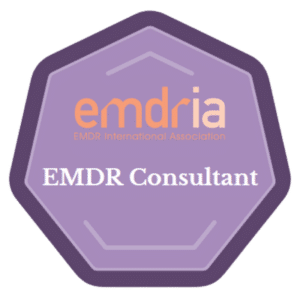
Are You Considering EMDR Consultation?
EMDR Consultation is one of the best ‘next steps’ for clinicians who have completed Basic Training to gain proficiency and mastery of the standard protocol and strengthen their professional status by becoming EMDRIA Certified therapists.
Benefits of EMDR Consultation
- Skills Development: Consultation can help enhance EMDR skills, and ensure the use of the techniques effectively and safely.
- Feedback: Consultations can help navigate complex cases and make informed decisions about treatment. This can improve the quality of care for clients.
- Troubleshooting: Consultation can assist in addressing challenges and obstacles that may arise during EMDR therapy sessions. Together we explore strategies to overcome difficulties and ensure the therapy progresses smoothly.
- Confidence Building: Working with a consultant can boost a therapist’s confidence in using EMDR, especially when working with complex cases or clients with multiple traumas.
- Community: Consultants often have connections within the EMDR community, providing therapists with opportunities to network, collaborate, and learn from other professionals in the field.
- Smaller Groups: Smaller group sizes equals more opportunities to present cases or answer individual questions.
- Certification: Ability to earn hours towards EMDRIA certification. Download your EMDRIA certification guide to learn more.
What to Expect in EMDR Consultation
As a consultee, you can expect to grow your knowledge and understanding of the standard protocol through an attachment lens in a safe and supportive environment. Here are a few areas that may be covered:
- The use of 8 phases of EMDR Therapy
- The AIP model and 3-pronged protocol
- Integrating Attachment Theory and Polyvagal Theory to enhance treatment and tailor interventions
- EMDR treatment planning and case conceptualization
- Target selection and sequencing
- Client readiness
- Complex PTSD and dissociation with EMDR protocol
- Integration of the protocol into specific cases
- Working through blocks with complex cases
- Handling abreaction and stuck points during processing
- Integration of EMDR therapy into consultee clinical setting
- Feedback and guidance on case presentations
- Consultee process (burnout, blocks, compassion fatigue, vicarious trauma)
- Address any other questions that arise during EMDR sessions
Consultation Schedule
Christina has various openings for EMDR individual and group consultation.
Get Started Here
Schedule your complimentary 30-minute meeting to learn more about EMDR consultation with Christina.
EMDR Consult InitialConsultation Agreements
You may download the Individual and Group Consultation agreements.

